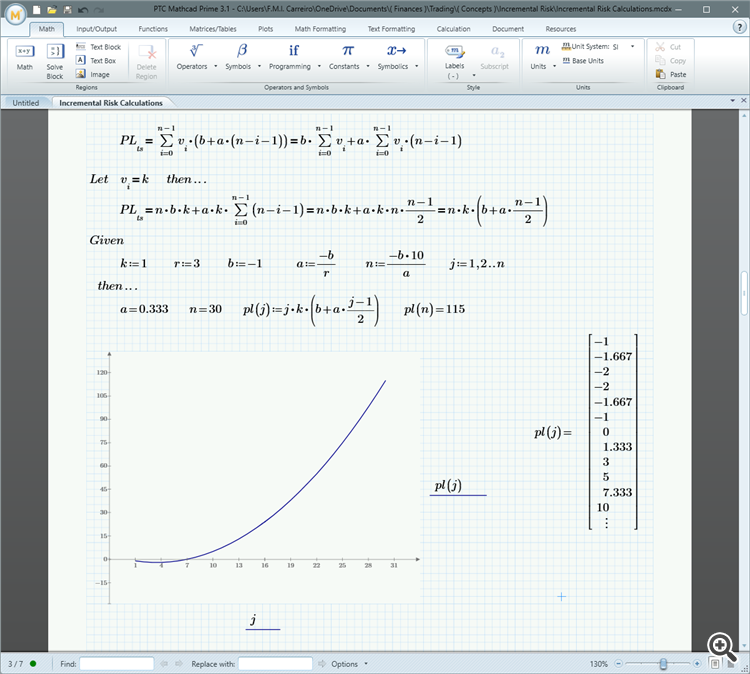Not sure yet, but I'm planning to study stochastic calculus.
Which language has a library for stochastic calculus/processes?
I could not find so much info on the Internet.
Does MQL have one?
No, MetaTrader is for Trading, not really for mathematics studies!
For studying Stochastic Calculus, you would be better off with an application or programing language, dedicated to Mathematics or Statistical calculations and/or analysis.
Maybe something like MathCAD, MatLab or R programing language, or maybe even Python (not sure, I don't use it).
I've only really used MathCAD for Engineering math, so can't be sure of which would be the best suited for you!
No, MetaTrader is for Trading, not really for mathematics studies!
For studying Stochastic Calculus, you would be better off with an application or programing language, dedicated to Mathematics or Statistical calculations and/or analysis.
Maybe something like MathCAD, MatLab or R programing language, or maybe even Python (not sure, I don't use it).
I've only really used MathCAD for Engineering math, so can't be sure of which would be the best suited for you!
I am not sure about that, as I don't have much experience with such libraries and mathematics.
At least there are several libraries, notably ALGLIB which the OP could try. See also this article about how R was used to build these library.
mql5 has also an interesting graphic library.
Anyway the tools you named are of course the reference, but I think a lot can be done with mql5.

- 2016.10.10
- MetaQuotes Software Corp.
- www.mql5.com
I am not sure about that, as I don't have much experience with such libraries and mathematics.
At least there are several libraries, notably ALGLIB which the OP could try. See also this article about how R was used to build these library.
mql5 has also an interesting graphic library.
Anyway the tools you named are of course the reference, but I think a lot can be done with mql5.
Well that may be true, but using that line of thinking, I could also say that most languages such as C, C++, C#, Java (and even JavaScript) have such libraries, but I would not recommend those (and even less MQL) for serious mathematics studies!
Well that may be true, but using that line of thinking, I could also say that most languages such as C, C++, C#, Java (and even JavaScript) have such libraries, but I would recommend those (and even less MQL) for serious mathematics studies!
May I ask why ? Are these mql libraries not good ?
I suppose the goal is to apply these maths to trading, so why using several languages ? (of course in case the mql libraries are good enough in terms of features and performance).
I suppose the goal is to apply these maths to trading, so why using several languages ? (of course in case the mql libraries are good enough in terms of features and performance).
Because when you are studying math, you want to be able to quickly do other things, such as view Graph plots, see Equations in the usual math formats and other such things.
With applications like MathCAD and MatLab (not much so the pure languages like R and Python), one can easily do it in just a few clicks, and bring up such functionality.
For R and Python, obviously this would require some more work, but there are very large Mathematics, Statistics and Scientific communities behind them, that makes it easier for students in the fields to exchange ideas, thoughts, code examples, etc.
You don't really expect such a communities, to suddenly appreciate engaging in such matters in MQL code, do you?
PS! Obviously, after the studies, he is free to apply that knowledge in MQL for trading purposes!
Because when you are studying math, you want to be able to quickly do other things, such as view Graph plots, see Equations in the usual math formats and other such things.
With applications like MathCAD and MatLab (not much so the pure languages like R and Python), one can easily do it in just a few clicks, and bring up such functionality.
For R and Python, obviously this would require some more work, but there are very large Mathematics, Statistics and Scientific communities behind them, that makes it easier for students in the fields to exchange ideas, thoughts, code examples, etc.
You don't really expect such a communities, to suddenly appreciate engaging in such matters in MQL code, do you?
PS! Obviously, after the studies, he is free to apply that knowledge in MQL for trading purposes!
Thank you both.
As Fernando indicated, Matlab or R seem to be the reasonable choices for studying the subject, developing algorithms ...
And MQL for implementing them later.
- Free trading apps
- Over 8,000 signals for copying
- Economic news for exploring financial markets
You agree to website policy and terms of use

Not sure yet, but I'm planning to study stochastic calculus.
I could not find so much info on the Internet.
Which language has a library for stochastic calculus/processes?
Does MQL have one?